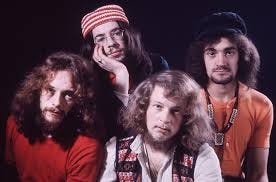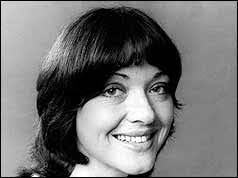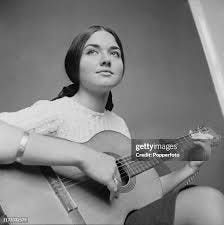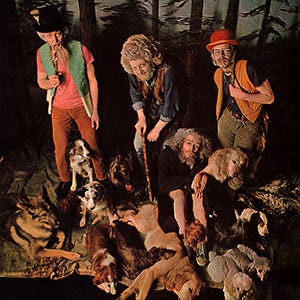Jethro Tull
When did I see them?
I well remember seeing Jethro Tull perform at Manchester University Students’ Union before they released any records. I bought (or perhaps one of my flat matés did) This Was, their first album, as soon as it was released, and we played it to death. I could not precisely remember the date that I saw them. I will go into that in more detail later.
I was at Manchester University from October 1966 to June 1969. The welcoming committee on the first day included the then president of the students’s union, Anna Ford. She was up on the stage and I was a humble groundling grovelling down below. I was struck by the loveliness of her face.
From my vantage point, I noted that her ankles looked a little chubby. Anna later went on to great things. Like me, she was born in Gloucestershire, but she has achieved much more than me, such as falling out with Martin Amis and throwing a glass of wine in Jonathan Aitken’s face. She worked at Granada TV and the BBC before becoming the first female newscaster on ITN’s News at Ten. She also became a director of Sainsbury’s and Vice Chancellor of her old alma mater.
My first gig in the union hall, the 1966 Freshers’ Ball, featured The Mindbenders fronted by Eric Stewart. They played Groovy Kind of love innumerable times.
Over the years, I saw the following at the union hall:
Paul Butterfield Blues Band
Stevie Wonder
Cream
The Who
Jethro Tull
The Crazy World of Arthur Brown
Graham Bond Organisation
The Mindbenders
Colosseum
Chris Farlowe and the Thunderbirds
There must be more, but the synapses are not firing like they used to. I cannot fix the date when I saw Jethro Tull.
The bookings for the Union were made by the social secretary. Chris Wright went to Manchester University in 1962 and took on the job of social secretary. After getting a BA in Politics and Modern History, Wright signed up for a further year at the Manchester Business School but attended so few classes he was not awarded a diploma. He began working for the Ian Hamilton Agency, representing, among others, Anna Ford, who was trying to be a folk singer.
In 1966, Wright discovered a band in Nottingham called the Jay Birds, fronted by a virtuoso guitarist called Alvin Lee. Wright became the Jay Birds’ manager and moved to London. The Jay Birds became Ten Years After and achieved great success. Terry Ellis, another social secretary turned booking agent, joined with Wright to form the Ellis-Wright agency and Chrysalis Records. The first Chrysalis Records release was This Was by Jethro Tull.
The Manchester University Students’ Union social secretary, whom I can still picture wearing a salmon-coloured satin shirt, was Doug D’Arcy.
This is from Doug’s blog:
Office 1 — My music business life in seven offices
“At Manchester University Chris Wright was the Social Secretary responsible for booking the bands for the Students Union dances. We got to know each other because we shared an obsession with the music scene and went to a lot of gigs together. We ended up living in the same house in Brooks Bar and since Chris had a car we were able to do the rounds of all the clubs in the city, cabarets like the Princess Club and the Domino Club that featured singers, comedians and strippers, night clubs like Mr Smiths with crooners and gambling but best of all the blues and soul clubs like The Cavern, Heaven and Hell and the Twisted Wheel with their legendary ‘all nighters’. This became our regular pattern for a couple of years.”
Doug continues:
“I learned from Chris how the band booking process worked and I was able to book the artists for the Students Union when he left. I also worked with some of the local promoters like the Abadi Brothers at The Twisted Wheel and Peter Stringfellow at The Mojo in Sheffield on ‘doubles’. These are bookings where artists play an early show at my venue and a late set in their club. They, of course, pay less.”
My friend, Roger Eagle, also had dealings with Jack, Phillip and Ivor Abadi.
https://pcolman.wordpress.com/2012/09/03/roger-eagle/
I must have heard some good reports of Jethro Tull and was expecting to like them when they appeared at the union. They did material from their forthcoming first album. I liked the album and so did most critics.
Record Mirror commended it for being "full of excitement and emotion" and described the band as a blues ensemble "influenced by jazz music" capable of setting "the audience on fire." Allen Evans of New Musical Express wrote that the album "sounds good and has a lot of humour about it" and that the band "play jazz really, in a soft, appealing way, and have a bit of fun on the side with tone patterns and singing".
Sid Smith of BBC Music wrote that "what made Tull stand out from the great-coated crowd (of touring bands) was the high-visibility of frontman Ian Anderson's on-stage Tourette's-inspired hyper-gurning and Mick Abraham's ferocious fretwork." An AllMusic reviewer remarked how Jethro Tull seemed "vaguely reminiscent of the Graham Bond Organization only more cohesive, and with greater commercial sense". David Davies of Record Collector reminds how "This Was only hints at the depth and majesty of the ensuing seven albums", but also wrote that "the direct, unfussy and predominantly blues-based" tracks of the original recordings and the extra tracks of the collector's edition "could well come as something of a surprise" and "be of the greatest interest to Tull aficionados."
The album reached number 10 on the UK Albums Chart and number 62 on the US Billboard 200.
Robert Christgau didn’t like it. I managed to fall out with Christgau within seconds of joining Substack. When some hapless New Zealander dared to express a mild criticism of Kamala Harris, Christgau told him to shut up and fuck off; the Kiwi did not have any right, said the Dean of Rock criticism, to express an opinion about American politics because he lived thousands of miles away from that fair land. We are now suffering all over the world for the bad choices of Americans.
Doug D’Arcy wrote this on his blog: “Jethro Tull have released their first album ‘This Was’ through a deal that Terry made with Island Records and it has reached the Top Ten album charts. Terry’s gamble of paying for the recording and producing the album for Chrysalis has paid off, and we hear that US labels are bidding for the rights to the record and an American tour is being booked. In the middle of this there is drama when Mick Abrahams the lead guitarist leaves the band. It’s just before they are due to film the ‘Rolling Stones Rock n’ Roll Circus’ which features, as well as the Stones, John and Yoko, the Who and Marianne Faithfull. There are secret auditions for a new guitarist and rumours about who is in the running circulate the office and the music press. Tongues are wagging but everyone’s lips are sealed. I’m shocked that it’s happening and wish I could go to the ‘Rock n’ Roll Circus’ recording but it doesn’t seem to be on the cards.”
Christgau was not impressed by This Was. “Ringleader Ian Anderson has come up with a unique concept that combines the worst of Roland Kirk, Arthur Brown, and your nearest G.O. blues band. I find his success very depressing. C MINUS.” I saw Roland Kirk also when I was at university and feel better for the experience. There were two separate campuses in those days. I was at The Victoria University of Manchester (known as Owens). The other campus was The University of Manchester Institute of Science and Technology (UMIST). Kirk played at UMIST but I have only just learned that Doug D’Arcy did the booking of Kirk for UMIST. Jethro Tull play a Roland Kirk tune, Serenade to a Cuckoo, on their first album.
The version of Jethro Tull on This Was is jazzier and more bluesy than later incarnations. I have just listened to it again (several times) after a long break and still enjoyed it. It brings back a certain time and atmosphere. To me it brings back happy memories of British jazz, blues and folk of the 50s and 60s. Perhaps Christgau would not appreciate Bert Jansch, John Renbourne, Davy Graham, Wizz Jones, Cyril Davies, Alexis Korner, Victor Brox, Chris Barber, Long John Baldry and Tubby Hayes, but I do.
Judge for yourself:
My Sunday Feeling. There is innovation here with the use of flute as a lead instrument in a rack and blues band. “Won’t somebody tell me where I laid my head last night? / I really don’t remember / But with one more cigarette, I think I might.
Some Day the Sun Won’t Shine for You. “In the morning, I’ll be leaving / I’ll leave your mother, too.” No flute, bass or drums on this one, just a blues with Anderson on mouth harp and Abrahams on guitar.
Beggar’s Farm. Lots of improvisational interplay between Abrahams's guitar and Anderson’s flute. This is the looser, jazzier side of Tull.
Move On Alone. The first appearance of keyboardist and arranger Dee Palmer, who adds strings and horns to the mix. Abrahams was the only member other than Anderson to write and sing lead on a Jethro Tull song.
Serenade to a Cuckoo. Surprising to note that when Tull started, Anderson had only been playing flute for a couple of weeks. He said that every time he went on stage it was a flute lesson. He was influenced by Roland Kirk’s 1964 album I Talk with the Spirits.
Dharma for One. I was puzzled that YouTube Music provides lyrics for this one when the record is totally instrumental. On live appearances, Anderson chanted the words like a mantra. This track features a homemade wind instrument called a claghorn. Anderson called it the “reluctant bastard offspring” of a bamboo flute, the mouthpiece of a saxophone and the bell of a child’- a bamboo flute, the mouthpiece of a saxophone and the bell of a child’s trumpet. I could do without Clive Bunker’s lengthy drum solo.
It’s Breaking Me Up. Here we have a rather formulised blues with a grizzled old Anderson from the Fylde Coast, pretending he’s from the Mississippi Delta, bemoaning the treachery of his woman.
Cat’s Squirrel. This was by a real Mississippi bluesman, Dr Ross. Lots of British blues bands did this in the late 60s.I prefer this to Cream’s leaden version. Anderson does not appear on this track.
A Song for Jeffrey. Jeffrey Hammond, the band’s future organist, was not on this album. He was a former schoolfriend of Anderson who took the opportunity to work him into song titles. On this track, Anderson paints Hammond as an aimless waster: “Gonna lose my way tomorrow / Gonna give away my car / Don’t see, see, see where I’m going.”
Round. This ends the album on a somewhat bathetic note. A brief piece of tentative jazz influenced by Roland Kirk.
The line-up was:
Ian Anderson – lead vocals (all except track 4), flute, mouth organ, claghorn, piano
Mick Abrahams – electric guitar, nine-string guitar, lead vocals (track 4), co-lead vocals (track 2), backing vocals
Glenn Cornick – bass guitar
Clive Bunker – drums, percussion hooter, charm bracelet
Additional musicians
Dee Palmer – French horn and orchestral arrangements
Production
Terry Ellis – producer
Victor Gamm – engineer
At this point, Jethro Tull was a club and small venues band rather than stadium megastars. Mick Abrahams was the lead guitarist on This Was, his only album with Jethro Tull before going on to Blodwyn Pig. I can understand some people, especially Americans, might not take to this record. Along with other British jazz rock efforts of the time, I find this is let down by the vocals and the production, which give a somewhat amateurish air. Perhaps the lack of a unified style is a problem. Are they too versatile for their own good? Eclecticism means lack of cohesion? Add to this the folky element and the accents. Ian Anderson was born in Scotland but brought up in Blackpool. In late 1967, Anderson was still holding down a day job, namely cleaning the Ritz Cinema in Luton, including the toilets. I do not detect a Scottish accent. For me it is a plus point that the Beatles do not affect American accents. It does not undermine their credibility that George Harrison pronounces “hair” as “her”. It strikes me as ludicrous the way Mick Jagger tries to sound like a Southern redneck. Having said that, the accents on many 60s and 70s albums sounds inauthentic. This Was is one such album.
I have been digging away trying to establish the date on which I saw Jethro Tull. One can achieve marvellous feats of research with the internet, but all my hard work has left me confused. I studied the following website which purports to show Jethro Tull’s tour schedule from 1965 to 1970:
https://www.collecting-tull.com/TourSchedule/TourSchedule60s.htm
From 1966 to 1969, I was away from Manchester during those years for the Christmas and summer vacations. That narrows down the probability of dates when I could have seen Jethro Tull live at Manchester University Students’ Union.
I was becoming fairly confident that that I saw them on 20 July 1968, as there is a record of them playing on that date at The Magic Village. it was common practice for bands to play at the Union and then move on to Roger’s club. I am not so confident now because there is no Manchester University gig listed on the that website.
The band had many gigs in central Manchester and too many for me to list in the Greater Manchester area and the northwest as a whole. A punishing workload which must have helped them to hone their craft. Bands had to work hard in them days:
02 Apr 1966 Twisted Wheel
03 Apr 1966 Twisted Wheel
That is a full 59 years to the day from when I was writing this.
The Twisted Wheel was another of Roger Eagle’s ventures.
11 Apr 1966 Oasis
13 May 1966 Jigsaw
31 May 1966 Oasis
24 Jun 1966 Oasis,
29 Jun 1966 Red Robin, Manchester
16 Jul 1966 Top Twenty, Droylsden (That is part of Openshaw, where I worked from 1970 to 1976. Eric Stewart’s mother was one of my clients. Davy Jones was born there. Myra Hindley was raised in the area.)
23 Jul 1966 Oasis Club, Manchester
1 Jul 1966 Belle Vue, Manchester
27 Aug 1966 Top Of The Town, Manchester
16 Sep 1966 Top Of The Town, Manchester
22 Oct 1966 Stax, Manchester
28 Nov 1966 Stax, Manchester
04 Jul 1967 Didsbury College, Manchester
In 1968, the band spent more time down south, playing gigs at the Marquee and Klook’s Kleek and even the illustrious Star Hotel, Croydon, near where I am writing this. There was even a foray into Denmark.
Back again to Manchester:
07 Sep 1968 The Magic Village, Manchester
No mention of Manchester University until 18 Jan 1969. Their next gig after that was The Fillmore in San Francisco followed by a tour of the US, which looks particularly punishing. Back to reality in May 1969, with a gig at the Manchester Free Trade Hall, which is a step up from Droylsden. They also went abroad to Sweden and Holland plus Cork and Dublin and then back to the States. How could anyone survive this workload!?
So, I am now puzzled about the date that I saw Jethro Tull. I had been thinking it was 1966 or 1967. I had then convinced myself it was 20 July 1968. That was a Saturday. I have no doubt that that the gig was on a Saturday evening. Another contender is 07 Sep 1968, which is a Saturday when they played at the Magic Village.
I suppose no list is definitive. There is another list here:
http://www.ministry-of-information.co.uk/setlist/69.htm
This list does not claim finality like the other list. “We're still unsure of several setlists - can you help?” It allows for the amnesia of elderly people like mygoodself. Someone claims to have seen Jethro Tull at the Union on 07 January 1969 along with Manfred Mann. Nobody else seems to remember this. The editor of the list speculates that this could have been 4 January, but I think both would have been too late for my recollection.
This list shows them performing at the Union on 10 February 1968. A member of the band recalls them supporting Cream at this venue, possibly on this date. I saw both bands at this venue, but I definitely saw them separately.
This list also shows them performing at The Magic Village on 06 April 1968, which was a Saturday. They are also shown at The Magic Village on 20 July 1968, which was a a Saturday. And 07 September, 1968, which was a Saturday. They were at The Magic Village again on 23 November 1968, which was a Saturday.
Whenever I saw them, I know that I saw them and am sure it was before their first album was released.
I tried to resolve this by writing to Doug D’Arcy the Mr Booking Agent Man. He has not yet replied.
Can anyone out there help?






What a trip down musical memory lane. I saw some great acts at our local polytechnic in Coventry in the 70’s(10p for a bottle of Newky Brown helped) like a lot of British bands of the time, they started with blues but spread out to encompass much more.
This is a great post. I remember picking up this album when it arrived at a radio station where a friend was a DJ. He let me go through the albums and take the ones he didn’t want or would never play cuts from. I did enjoy the album quite a lot and was a little perplexed at the shift they made with the next outing. However that turned out to be the correct choice as Abraham’s and Bloodwyn Pig continued with their bluesy direction and faded from the scene, or at least my album collection.